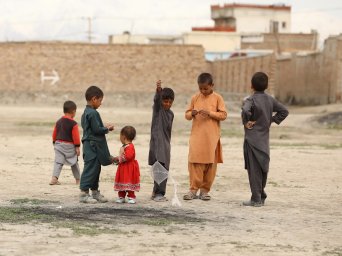- About
- Topics
- Picks
- Audio
- Story
- In-Depth
- Opinion
- News
- Donate
- Signup for our newsletterOur Editors' Best Picks.Send
Read, Debate: Engage.
| topic: | Human Rights |
|---|---|
| located: | Afghanistan, China |
| editor: | Shadi Khan Saif |
After the crumbling of the West’s attempt of establishing democracy in Afghanistan, China has swiftly sought to use the opportunity to its advantage while the de facto Taliban rulers desperately seek funds and recognition.
Celebrating the US’s sudden rush to exit from Afghanistan as a military victory, the Taliban has been fully exploiting the isolation and non-recognition of their government to peddle their oppressive policies and escape accountability both at home and on the international stage.
However, since the Taliban stormed Kabul in August, 2021 on the heels of the Doha agreement with the US, Chinese involvement with the war-ravaged country has increased significantly, revitalising trade activities and intensifying diplomatic engagements with the new government.
Within a year of the Taliban rule over Afghanistan, it has become quite evident if there is any external power that can compel the unreformed Taliban to change course towards betterment, it is China.
To carry the burden of crippling international sanctions, the Taliban relies largely on Chinese support. Unlike the West, which has lost its credibility after its messy departure, this gives Beijing a clear advantage, which it could use as leverage to make support conditional to, for instance, the reopening of schools for girls, the formation of an inclusive government and the advancement of women’s rights.
The question is will Beijing bother?
So far, it seems that Chinese authorities are ignoring the abuses of human rights in Afghanistan, instead choosing to solidify their own geostrategic interests and access the country’s abundant natural resources.
Of course, Beijing is not the only regional actor playing this game - Russia, Pakistan and Iran have also shown interest in making arrangements with the new Taliban government. The Afghan people, on the other hand, see some hope that these countries might use their leverage to advance their wellbeing under the hardline regime.
Over the past year, the US-led policy of isolating Afghanistan has had little effect in advancing human rights. In fact, it is only aggravating the humanitarian crisis by holding hostage its resources, while also allowing the Taliban to blame the West for its own failures in service delivery and human rights violations.
Nevertheless, the international community, including the US, must ensure that China’s dealing with the Taliban does not exploit the country’s delicate position. The war-torn country has bountiful natural resources - but at the same time it is too poor and vulnerable to secure a fair deal with the mighty Chinese state-owned firms that relentlessly hunt for cheap resources.
Every Chinese manoeuvre in Afghanistan needs to be carefully analysed to ensure it does not do any harm to the nation that's already enduring a devastating humanitarian crisis.
Photo by Sohaib Ghyasi

